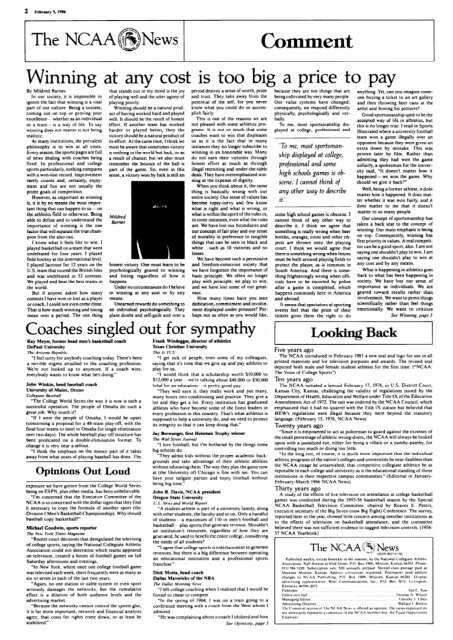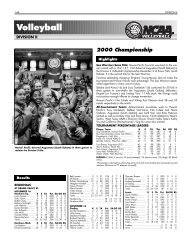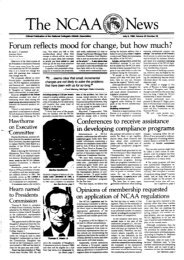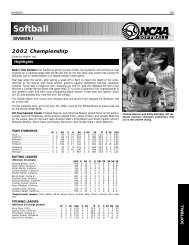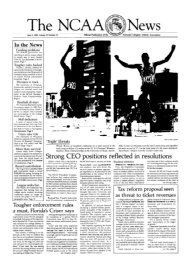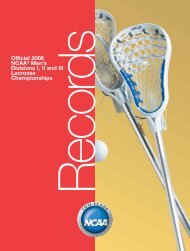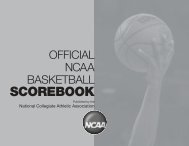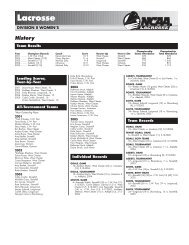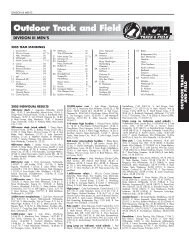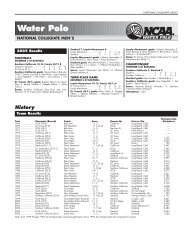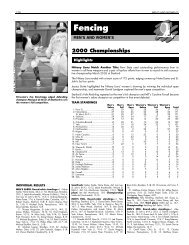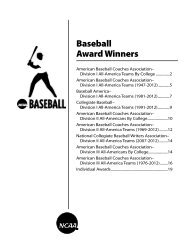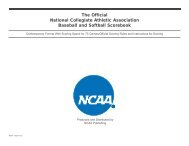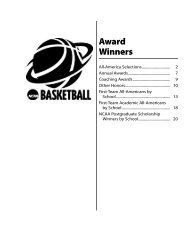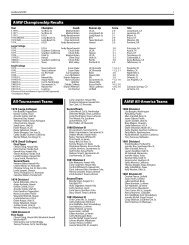The NCAA News - National Collegiate Athletic Association
The NCAA News - National Collegiate Athletic Association
The NCAA News - National Collegiate Athletic Association
You also want an ePaper? Increase the reach of your titles
YUMPU automatically turns print PDFs into web optimized ePapers that Google loves.
2 February 5,1986<br />
<strong>The</strong> <strong>NCAA</strong> Comfnent<br />
Winning at any cost is too big a price to pay<br />
By Mildred Barnes<br />
In our society, it is impossible to<br />
ignore the fact that winning is a vital<br />
part of our culture. Being a success,<br />
coming out on top or proving your<br />
excellence-whether as an individual<br />
or a team- ,is a way of life. To say<br />
winning does not matter is not being<br />
realistic.<br />
At many institutions, the prevalent<br />
philosophy is to win at all costs.<br />
Every season, the sports pages are full<br />
of news dealing with coaches being<br />
fired. In professional and college<br />
sports particularly, nothing compares<br />
with a won-lost record. Improvement<br />
rarely counts and, certainly, enjoy-<br />
ment and fun are not usually the<br />
prime goals of competition.<br />
However, as important as winning<br />
is, it is by no means the most impor-<br />
tant thing that can happen to us-on<br />
the athletics field or otherwise. Being<br />
able to define and to understand the<br />
importance of winning is the one<br />
factor that will separate the true cham-<br />
pion from the also-ran.<br />
I know what it feels like to win. I<br />
played basketball on a team that went<br />
undefeated for four years. I played<br />
field hockey at the international level.<br />
1 played lacrosse for 12 years on the<br />
U.S. team that toured the British Isles<br />
and was undefeated in 53 contests.<br />
We played and beat the best teams in<br />
the world.<br />
But if anyone asked how many<br />
contests 1 havewon or lost as a player<br />
or coach, I could not even come close.<br />
That is how much winning and losing<br />
mean over a period. <strong>The</strong> one thing<br />
that stands out in my mind is the joy<br />
of playing well and the utter agony of<br />
playing poorly.<br />
Winning should be a natural prod-<br />
uct of having worked hard and played<br />
well. It should be the result of honest<br />
effort. If another team has worked<br />
harder or played better, then the<br />
victory should be a natural product of<br />
its effort. At the same time, I think we<br />
must be aware that sometimes victory<br />
is nothing in the world but luck, or as<br />
a result of chance; but we also must<br />
remember the bounce of the ball is<br />
part of the game. So, even in this<br />
sense, a victory won by luck is still an<br />
Mildred<br />
Barnes<br />
honest victory. One must learn to be<br />
psychologically geared to winning<br />
and losing regardless of how it<br />
happens.<br />
Under no circumstances do 1 believe<br />
in winning at any cost or by any<br />
means.<br />
Unearned rewards do something to<br />
an individual psychologically. <strong>The</strong>y<br />
plant doubt and self-guilt and over a<br />
Coaches singled out for sympathy<br />
Ray Meyer, former head men’s basketball coach Frank Windegger, director of athletics<br />
DePaul University Texas Christian University<br />
771~ Arrrono Republic This Is K’U<br />
“I feel sorry for anybody coaching today. <strong>The</strong>re’s been<br />
a terrible stigma attached to the coaching profession.<br />
We’re not looked up to anymore. If a coach wins,<br />
everybody wants to know what he’s doing.”<br />
John Winkin, head baseball coach<br />
University of Maine, Orono<br />
Colle+re Baseball<br />
“<strong>The</strong> College World Series the way it is now is such a<br />
successful operation. <strong>The</strong> people of Omaha do such a<br />
great job. Why touch it?<br />
“if I were the people of Omaha, I would be upset<br />
(concerning a proposal for a 4%team play-off, with the<br />
final four teams to meet in Omaha for single elimination<br />
over two days). <strong>The</strong> whole baseball play-off structure has<br />
been predicated on a double-elimination format. To<br />
change it is very near a sellout.<br />
“I think the emphasis on the money part of it takes<br />
away from what years of playing baseball has done. <strong>The</strong><br />
Opinions Out Loud<br />
exposure we have gotten from the College World Series<br />
being on ESPN, plus other media, has been unbelievable.<br />
“I’m concerned that the Executive Committee of the<br />
<strong>NCAA</strong> is so concerned with the dollar signs that they find<br />
it necessary to copy the formula of another sport (the<br />
Division I Men’s Basketball Championship). Why should<br />
baseball copy basketball’l”<br />
Michael Goodwin, sports reporter<br />
<strong>The</strong> New York Times Magazine<br />
“Recent court decisions that deregulated the televising<br />
of college sports, saying the <strong>National</strong> <strong>Collegiate</strong> <strong>Athletic</strong><br />
<strong>Association</strong> could not determine which teams appeared<br />
on television, created a boom of football games on fall<br />
Saturday afternoons and evenings.<br />
“In New York, where once one college football game<br />
was televised each week, there frequently were as many as<br />
six or seven in each of the last two years.<br />
“Again, no one station or cable system or even sport<br />
seriously damages the networks, but the cumulative<br />
effect is a dilution of both audience levels and the<br />
advertising market.<br />
“Because the networks cannot control the sports glut,<br />
it is far more important, network and financial analysts<br />
agree, that costs for rights come down, or at least be<br />
stabilized.”<br />
“I get sick of people, even some of my colleagues,<br />
saying that it’s time that we give up and pay athletes to<br />
play for us.<br />
period destroy a sense of worth, pride<br />
and trust. <strong>The</strong>y take away from the<br />
potential of the self, for you never<br />
know what you could do or accom-<br />
plish fairly.<br />
This is one of the reasons we are<br />
not pleased with some athletics pro-<br />
grams. It is not so much that some<br />
coaches want to win that displeases<br />
us as it is the fact that in many<br />
instances they no longer subscribe to<br />
winning in an honorable way. Many<br />
do not earn their victories through<br />
honest effort as much as through<br />
illegal recruiting and under-the-table<br />
deals. <strong>The</strong>y have overemphasized win-<br />
ning at the expense of dignity.<br />
When you think about it, the same<br />
thing is basically wrong with our<br />
entire society. Our sense of values has<br />
become topsy-turvy and few know<br />
what is right and what is wrong, or<br />
what is within the spirit of the rules or,<br />
in some instances, even what the rules<br />
are. We have lost our boundaries and<br />
our concept of fair play and our sense<br />
of morality in preference to tangible<br />
things that can be seen in black and<br />
white . such as IO victories and no<br />
losses.<br />
We have become such a permissive<br />
and freedomconscious society that<br />
we have forgotten the importance of<br />
basic principle. We often no longer<br />
play with principle; we play to win,<br />
and we have lost some of our great-<br />
ness.<br />
How many times have you seen<br />
dedication, commitment and involve-<br />
ment displayed under pressure? Per-<br />
haps not as often as you would like,<br />
“I would think that a scholarship worth $10,000 to<br />
$l2,OflO a year ~ we’re talking about $48,000 or g50,OOO<br />
total for an education-is pretty good pay.<br />
“<strong>The</strong>y well earn it; they really work and put many,<br />
many hours into conditioning and practice. <strong>The</strong>y give a<br />
lot and they get a lot. Every institution has graduated<br />
athletes who have become some of the finest leaders in<br />
every profession in this country. That’s what athletics is<br />
supposed to help a university do, and we need to protect<br />
its integrity so that it can keep doing that.”<br />
Jay Berwnngcr, first Heisman Trophy winner<br />
<strong>The</strong> Wall Streer Journal<br />
“I love football, but I’m bothered by the things some<br />
big schools do.<br />
“<strong>The</strong>y admit kids without the proper academic backgrounds<br />
and take advantage of their athletic abilities<br />
without educating them. <strong>The</strong> way they play the game now<br />
at (the University of) Chicago is fine with me. You can<br />
have your tailgate parties and enjoy football without<br />
being big time.”<br />
John R. Davis, <strong>NCAA</strong> president<br />
Oregon State University<br />
il. S. <strong>News</strong> and World, Report<br />
“A student-athlete is part of a university family, along<br />
with other students, the faculty and so on. Only a handful<br />
of students-a maximum of I10 in men’s football and<br />
basketball-play sports that generate revenue. Shouldn’t<br />
an institution’s resources, regardless of how they are<br />
generated, be used to benefit the entire college, considering<br />
the needs of all students?<br />
“1 agree that college sports is entertainment to generate<br />
revenues, but there is a big difference between operating<br />
an educational institution and a professional sports<br />
franchise.”<br />
Dick Motta, head coach<br />
Dallas Mavericks of the NBA<br />
<strong>The</strong> Dullas Morning <strong>News</strong><br />
“I left college coaching when 1 realized that I would be<br />
forced to cheat to compete.<br />
“In the spring of 1964, I was on a train going to a<br />
conference meeting with a coach from the West whom I<br />
admired.<br />
“He was complaining about a coach I idolized and how<br />
See Opinions. page 3<br />
because they are not things that are<br />
being cultivated by very many people.<br />
Our value systems have changed;<br />
consequently, we respond differently<br />
physically, psychologically and ver-<br />
bally.<br />
To me, most sportsmanship dis-<br />
played at college, professional and<br />
‘To me, most sportsmanship<br />
displayed at college,<br />
professional and some<br />
high schools games is obscene.<br />
I cannoi think of<br />
any other way to describe<br />
it.’<br />
some high school games is obscene. I<br />
cannot think of any other way to<br />
describe it. I think we agree that<br />
something is really wrong when beer<br />
bottles, oranges, coins and other ob-<br />
jects are thrown onto the playing<br />
court. I think we would agree that<br />
there is something wrong when fences<br />
must be built around playing fields to<br />
protect the player, as is common in<br />
South America. And there is some-<br />
thing frighteningly wrong when off-<br />
cials have to be escorted by police<br />
after a game is completed, which<br />
happens commonly here in America<br />
and abroad.<br />
It seems that spectators at sporting<br />
events feel that the price of their<br />
tickets gives them the right to do<br />
Looking Back<br />
anything. Yet, can you imagine some-<br />
one buying a ticket to an art gallery<br />
and then throwing beer cans at the<br />
artist and booing his pictures?<br />
Good sportsmanship used to be the<br />
accepted way of life in athletics, but<br />
this is no longer true. 1 read in Sports<br />
Illustrated where a university football<br />
team won a game illegally over an<br />
opponent because they were given an<br />
extra down by mistake. This was<br />
proven later by film. Rather than<br />
admitting they had won the game<br />
unfairly, a spokesman for the univer-<br />
sity said, ‘It doesn’t matter how it<br />
happened-we won the game. Why<br />
should we give it back?’<br />
Well, being a former athlete, it does<br />
matter how it happened. It does mat-<br />
ter whether it was won fairly, and it<br />
does matter to me that it doesn’t<br />
matter to so many people.<br />
Our concept of sportsmanship has<br />
taken a back seat to the concept of<br />
winning. Our main emphasis is being<br />
on top. Consequently, winning has<br />
first priority in values. A real competi-<br />
tor can be a good sport, also. I am not<br />
saying one shouldn’t play to win. I am<br />
saying one shouldn’t play to win at<br />
any cost and by any means.<br />
What is happening in athletics goes<br />
back to what has been happening in<br />
society. We have lost our sense of<br />
importance as individuals. We are<br />
geared toward results rather than<br />
involvement. We want to prove things<br />
scientifically rather than feel things<br />
emotionally. We want to criticize<br />
See Winning, page 3<br />
I<br />
Five years ago<br />
I<br />
<strong>The</strong> <strong>NCAA</strong> introduced in February 1981 a new seal and logo for use in all<br />
printed materials and for television purposes and awards. <strong>The</strong> revised seal<br />
depicted both male and female student-athletes for the first time. (“<strong>NCAA</strong>:<br />
<strong>The</strong> Voice of College Sports”)<br />
Ten years ago<br />
<strong>The</strong> <strong>NCAA</strong> initiated a lawsuit February 17, 1976, in U.S. District Court,<br />
Kansas City, Kansas, challenging the validity of regulations issued by the<br />
Department of Health, Education and Welfare under Title IX of the Education<br />
Amendments Act of 1972. <strong>The</strong> suit was ordered by the <strong>NCAA</strong> Council, which<br />
emphasized that it had no quarrel with the Title IX statute but believed that<br />
HEW’s regulations were illegal because they went beyond the statutory<br />
language. (February IS, 1976, <strong>NCAA</strong> <strong>News</strong>)<br />
Twenty years ago<br />
“Since it is empowered to act as policeman to guard against the excesses of<br />
the small percentage of athletic wrongdoers, the <strong>NCAA</strong> will always be looked<br />
upon with a jaundiced eye, either for being a villain or a namby-pamby, for<br />
controlling too much or doing too little.<br />
“In the long run, of course, it is much more important that the individual<br />
athletic programs of the nation’s colleges and universities be near-faultless than<br />
the <strong>NCAA</strong> image be untarnished; that competitive collegiate athletics be as<br />
reputable in each college and university as is the educational standing of those<br />
institutions in their respective campus communities.” (Editorial in January-<br />
February-March 1966 <strong>NCAA</strong> <strong>News</strong>)<br />
Thirty years ago<br />
A study of the effects of live television on attendance at college basketball<br />
games was conducted during the 1955-56 basketball season by the Special<br />
<strong>NCAA</strong> Basketball Television Committee, chaired by Reaves E. Peters,<br />
executive secretary of the Big Seven (now Big Eight) Conference. <strong>The</strong> survey,<br />
reported later in the year, showed little concern among member institutions as<br />
to the effects of television on basketball attendance, and the committee<br />
believed there was not sufficient evidence to suggest television controls. ( 1956-<br />
57 <strong>NCAA</strong> Yearbook)<br />
Published weekly. except biweekly in the summer. by the Natlc~~l C~lleg~atc Alhlelic<br />
Acsoc~t~on. Nail Avenue at 63rd Street. P.0. Box IYOh. Misston. Kansas 66201 Phone:<br />
913/3X4-3220. Subscriptvan rate. $20 annually prepaid Second~class postage paid at<br />
Shawnee Mw.mn. Kansas. Addrv\\ corrwtimx requested. Postmaster send address<br />
changes to <strong>NCAA</strong> Puhhshlny. PO Liw 1906. M&on. Kansas 66201. Display<br />
adverlking rcprescntarwe’ Host Communlcatvzms. Inc.. P.0. Hex 3071. I.cxmgton,<br />
Kentucky 405Yh-31171<br />
Publisher Ted C. Tow<br />
Fditor-in-Chic! rhoma> A. W~lwn<br />
Managing EdItor. _. .‘l‘imothy I I.~llev<br />
Advertising LXrector.. .Wallace I Kenlro<br />
I hc L‘ommcnt \cction 01 I he <strong>NCAA</strong> NUH. \ LI ollered as opinion. <strong>The</strong> wew~ expresrcd do<br />
not neceaardy represent a conrensu\ ol the NC-AA mcmhcrrhip An Fqual Opporlun~ly<br />
Employer.


